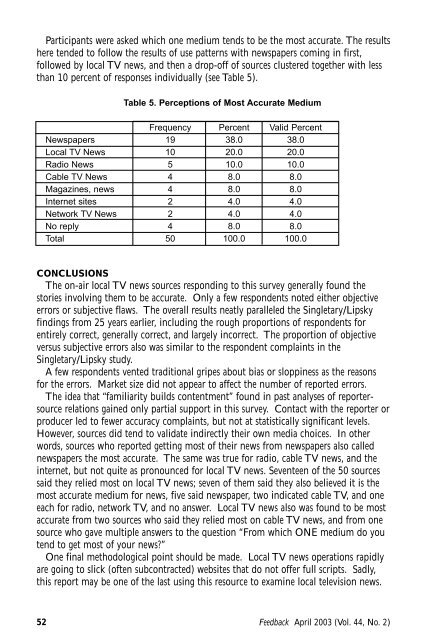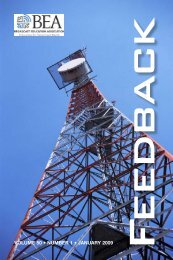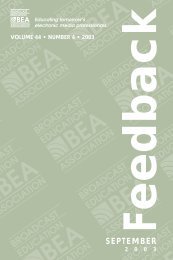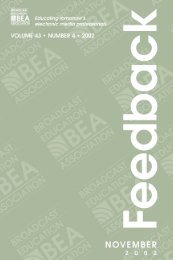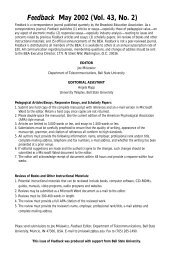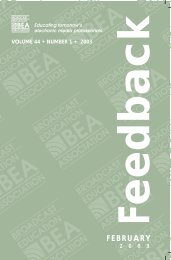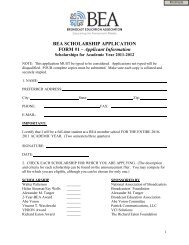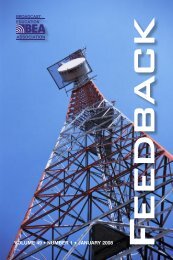Participants were asked which one medium tends to be the most accurate. The resultshere tended to follow the results of use patterns with newspapers coming in first,followed by local TV news, and then a drop-off of sources clustered together with lessthan 10 percent of responses individually (see Table 5).Table 5. Perceptions of Most Accurate MediumFrequency Percent Valid PercentNewspapers 19 38.0 38.0Local TV News 10 20.0 20.0Radio News 5 10.0 10.0Cable TV News 4 8.0 8.0Magazines, news 4 8.0 8.0Internet sites 2 4.0 4.0Network TV News 2 4.0 4.0No reply 4 8.0 8.0Total 50 100.0 100.0CONCLUSIONSThe on-air local TV news sources responding to this survey generally found thestories involving them to be accurate. Only a few respondents noted either objectiveerrors or subjective flaws. The overall results neatly paralleled the Singletary/Lipskyfindings from 25 years earlier, including the rough proportions of respondents forentirely correct, generally correct, and largely incorrect. The proportion of objectiveversus subjective errors also was similar to the respondent complaints in theSingletary/Lipsky study.A few respondents vented traditional gripes about bias or sloppiness as the reasonsfor the errors. Market size did not appear to affect the number of reported errors.The idea that “familiarity builds contentment” found in past analyses of reportersourcerelations gained only partial support in this survey. Contact with the reporter orproducer led to fewer accuracy complaints, but not at statistically significant levels.However, sources did tend to validate indirectly their own media choices. In otherwords, sources who reported getting most of their news from newspapers also callednewspapers the most accurate. The same was true for radio, cable TV news, and theinternet, but not quite as pronounced for local TV news. Seventeen of the 50 sourcessaid they relied most on local TV news; seven of them said they also believed it is themost accurate medium for news, five said newspaper, two indicated cable TV, and oneeach for radio, network TV, and no answer. Local TV news also was found to be mostaccurate from two sources who said they relied most on cable TV news, and from onesource who gave multiple answers to the question “From which ONE medium do youtend to get most of your news?”One final methodological point should be made. Local TV news operations rapidlyare going to slick (often subcontracted) websites that do not offer full scripts. Sadly,this report may be one of the last using this resource to examine local television news.52Feedback April 2003 (Vol. 44, No. 2)
REFERENCESBerry Jr., Fred C. (1967). A Study of Accuracy in Local News Stories of Three Dailies,Journalism Quarterly, 44, 482-90.Brown, Charles H. (1965, February 13). Majority of Readers Give Papers an A forAccuracy. Editor and Publisher, 13.Cameron, Glen T.; Sallot, Lynne M.; Curtin, Patricia A. (1997). Public Relations and theProduction of News: A Critical Review and Theoretical Framework. In Brent R.Burleson (Series Ed.) Communication Yearbook: Vol. 20 (Ch. 4, pp. 111-155).Thousand Oaks, CA: Sage Publications.Charnley, Mitchell V. (1936) Preliminary Notes on a Study of Newspaper Accuracy,Journalism Quarterly, 13, 394-401.Croteau, David and Hoynes, William (2000). How Business Strategy Shapes MediaContent. Retrieved Sept., 2001 from WWW from the site:http://www.people.vcu.edu/~dcroteau/370%20Media/business_ch_5.htmDonath, Bob. (2001, Jan. 1). Election lesson: Be precise in imprecision. Marketing News.Grossman, Lawrence K. (1997). Why Local TV News Is So Awful. Retrieved July, 2001from WWW from the site: http://www.cjr.org/year/97/6/grossman.aspMcClellan, S., Higgins, J., Trigoboff, D., McConell, B., Tedesco, R. (2000, November13) It’s Gore! It’s Bush! It’s a mess! Broadcasting & Cable, 47, 6-10.Howard W. Odum Institute for Research in Social Science Public Opinion PollQuestion Database (2001). http://www.irss.unc.edu/data_archive/pollsearch.html,accessed September 21, 2001, Roper Center at University of Connecticut PublicOpinion Online ACCESSION NUMBERS: 0306225, 0304537, 0311996 (July 1998,July 1998, and Oct. 1998).Ryan, Michael (1975). A Factor Analytic Study of Scientists’ Responses to Errors.Journalism Quarterly, 52, 333-6.Shaw, David. (1985, August 12). Papers get respondents’ nod for job well done; TV listedas primary source for news. Los Angeles Times, (Home Edition, Sec. 1, Pt. 1) p. 9.Singletary, Michael W., and Lipsky, Richard (1977). Accuracy in Local TV News.Journalism Quarterly, 54, 362-364.Whitaker, Ron. (2000). The Decline of TV News Credibility. Retrieved June, 2001 fromWWW from the site: http://www.cybercollege.com/tvnews.htmWTVF and WLOS have apparently stopped archiving scripts.WTVF, Nashville, Tennessee – www.newschannel5.com.WLOS, Asheville, North Carolina – www.wlos.comBEA—Educating tomorrow’s electronic media professionals 53
- Page 1 and 2:
Educating tomorrow’selectronic me
- Page 3 and 4:
CONTENTSESSAYTransitionsRalph J. Be
- Page 5 and 6: ESSAYTRANSITIONSBy Ralph J. Begleit
- Page 7 and 8: party. It was a fabulous experience
- Page 9 and 10: een accustomed to leaving my “whe
- Page 11 and 12: ADVISING:THE LITTLE SECRET HIDDEN I
- Page 13 and 14: • Total intake model—all studen
- Page 15 and 16: Response to the survey has never re
- Page 17 and 18: assessment of the Center in conclus
- Page 19 and 20: SENSE-MAKING AND THE PERSONALVIDEO
- Page 21 and 22: database. A limited implementation
- Page 23 and 24: RESEARCHTHE PARTICIPATION OF WOMENI
- Page 25 and 26: Local newsroom employmentIn July 20
- Page 27 and 28: the referral source of each person
- Page 30 and 31: Discussion and ConclusionsOur analy
- Page 32 and 33: Lind, R. A., & Braun, M. J. (1996,
- Page 34 and 35: downloading services. www.schoolsuc
- Page 36 and 37: major professional selling points i
- Page 38 and 39: COURSE GRADINGElement Percent of Du
- Page 40 and 41: REVIEWHyde, Stuart (2003). Idea to
- Page 42 and 43: The primary purpose of this study i
- Page 44 and 45: detailing the number of phone numbe
- Page 46 and 47: these newscasts that “primary”
- Page 48 and 49: As Table 1.3 shows, comparing only
- Page 50 and 51: RESEARCHACCURACY IN LOCAL TELEVISIO
- Page 52 and 53: anked 26 to 50. After eliminating n
- Page 54 and 55: 2. How often do news sources compla
- Page 58 and 59: These stations still archive script
- Page 60 and 61: TABLE 12002 BEA News Division stude
- Page 62 and 63: Eiles at WCHS-TV, Portland, Maine.
- Page 64 and 65: ESSAYWHAT’S OLD IS NEW AGAIN:THE
- Page 66 and 67: are. If the news agency editor or r
- Page 68 and 69: said Sagan, just as broadcast chann
- Page 70 and 71: “We’re perfectly positioned to
- Page 72 and 73: John Miller, News Director of KTVT-
- Page 74 and 75: CLASSROOMGUEST SPEAKERS IN BROADCAS
- Page 76 and 77: students just starting out, their m
- Page 78 and 79: professionals, often with varied jo
- Page 80 and 81: District NewsTo the members of Dist
- Page 82 and 83: several held on college campuses. I
- Page 84 and 85: 2ND PLACE: Jillian Oppegard, Colora
- Page 86 and 87: Faculty News CompetitionC.A. Tuggle
- Page 88 and 89: AWARD OF EXCELLENCE: Kevin Hager, W
- Page 90 and 91: BEA PRESIDENT’S MESSAGEGOALS AND
- Page 92: THANK YOU to the following individu


